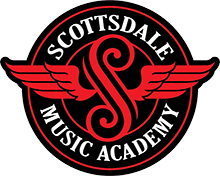 Bass Guitar Effects Pedals To Take Your Sound To Epic Levels
Bass Guitar Effects Pedals To Take Your Sound To Epic Levels
Trying to pick out the best or most important bass guitar effects pedal is a little bit like trying to name the best musician of all time. There is no clear cut winner; instead, there are several, equally epic, top contenders.
The same is true when it comes to bass guitar effects pedals. What’s considered the best will vary from guitarist to guitarist, with each musician having his or her own personal preference based on their individual needs and desired sound. Luckily, your guitar-lessons-and-gear-experts at Scottsdale Music Academy know how hard it can be to navigate the ever-expanding world of effects pedals, so we’re naming not one, but three amazing bass guitar effects pedals that we believe can enhance virtually any performance and help bassists achieve insane sounds.
But first, let’s explain what exactly bass pedals are for any newbies out there who have yet to learn about them through their bass guitar lessons in Scottsdale.
The Basics of Bass Guitar Effects Pedals
Essentially, bass guitar effects pedals are electronic devices which plug into your guitar and amp and are meant to give your guitar a specific sound or effect by manipulating the tone, pitch, or other aspect of the guitar. Like the name implies, guitar pedals are designed to be operated by the feet to allow guitarists to make quick changes without needing to rely on their hands.
In general, effects pedals help to add an extra dimension to a bassist’s sound, allowing them to unleash their creativity and express musical ideas in new ways.
Popular Bass Guitar Effects Pedals
Needless to say, guitar effects pedals can have a huge impact on your sound. Although there are many effects pedals to choose from, there are three in particular that are used most often by bass players. The popular bass guitar effects pedals we’re speaking of are octave pedals, overdrive pedals, and distortion pedals.
Octave Pedals:
This effects pedal is a unique and easy way of pitch-shifting which allows bass players to add an octave above or below the main note. Most bassists use it to add a lower octave in order to beef up their sound or deliver a fuzzed-out sounding effect similar to that of a synth pedal.
Use it if you want to: fatten up your tone.
Overdrive Pedals:
Overdrive pedals are a popular choice of pedal for bass guitar players because of the gritty, yet controlled tones they create. These effects pedals function by overdriving your signal with more juice than it can handle, causing the signal to distort or break up. The result is a throaty and warm sound.
Use it if you want to: add a little bit of fuzz to your sound.
Distortion Pedals:
Distortion pedals are very similar to overdrive pedals and operate in the same way. In fact, the two are often used interchangeably; yet there are subtle differences between them. The main difference being that distortion pedals allow for a heavier, chunkier sound due to their “hard clipping” setup, in which the signal is severely clipped (more so than is characteristic of overdrive pedals).
Use it if you want to: add more gain to your guitar signal to fully distort and amplify your sound.
The Bottom Line
Bass guitar effects pedals are a great way for guitar players to experiment with their sound and take things to another level. We encourage all bass guitar players to test out different types of effects pedals to help them create their signature sound.
To learn more about bass guitar effects pedals or more about bass guitar playing in general, sign up for our popular bass guitar lessons — Scottsdale’s number one source for all things bass!

